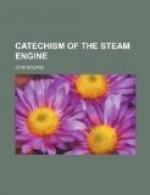395. Q.—Is there not a great loss of heat by blowing off so large a proportion of the heated water from the boiler?
A.—The loss is not very great. Boilers are sometimes worked at a saltness of 4/33rds, and taking this saltness and supposing the latent heat of steam to be at 1000 deg. at the temperature of 212 deg., and reckoning the sum of the latent and sensible heats as forming a constant quantity, the latent heat of steam at the temperature of 250 deg. will be 962 deg., and the total heat of the steam will be 1212 deg. in the case of fresh water; but as the feed water is sent into the boiler at the temperature of 100 deg., the accession of heat it receives from the fuel will be 1112 deg. in the case of fresh water, or 1112 deg. increased by 3.98 deg. in the case of water containing 4/33ds of salt— the 3.98 deg. being the 4.7 deg. increase of temperature due to the presence of 4/33rds of salt, multiplied by 0.847 the specific heat of steam. This makes the total accession of heat received by the steam in the boiler equal to 1115.98 deg., or say 1116 deg., which multiplied by 3, as 3 parts of the water are raised into steam, gives us 3348 deg. for the heat in the steam, while the accession of heat received in the boiler by the 1 part of residual brine will be 154.7 deg., multiplied by 0.85, the specific heat of the brine, or 130.495 deg.; and 3348 deg. divided by 130.495 deg. is about 1/26th. It appears, therefore, that by blowing off the boiler to such an extent that the saltness shall not rise above what answers to 4/33rds of salt, about 1/25th of the heat is blown into the sea; this is but a small proportion, and as there will be a greater waste of heat, if from the existence of scale upon the flues the heat can be only imperfectly transmitted to the water, there cannot be even an economy of fuel in niggard blowing off, while it involves the introduction of other evils. The proportion of 4/33rds of saltness, however, or 16 oz. to the gallon, is larger than is advisable, especially as it is difficult to keep the saltness at a perfectly uniform point, and the working point should, therefore, be 2/33rds as before prescribed.
396. Q.—Have no means been devised for turning to account the heat contained in the brine which is expelled from the boiler?
A.—To save a part of the heat lost by the operation of blowing off, the hot brine is sometimes passed through a number of small tubes surrounded by the feed water; but there is no very great gain from the use of such apparatus, and the tubes are apt to become choked up, whereby the safety of the boiler may be endangered by the injurious concentration of its contents. Pumps, worked by the engine for the extraction of the brine, are generally used in connection with the small tubes for the extraction of the heat from the supersalted water; and if the tubes become choked the pumps will cease to eject the water, while the engineer may consider them to be all the while in operation.




